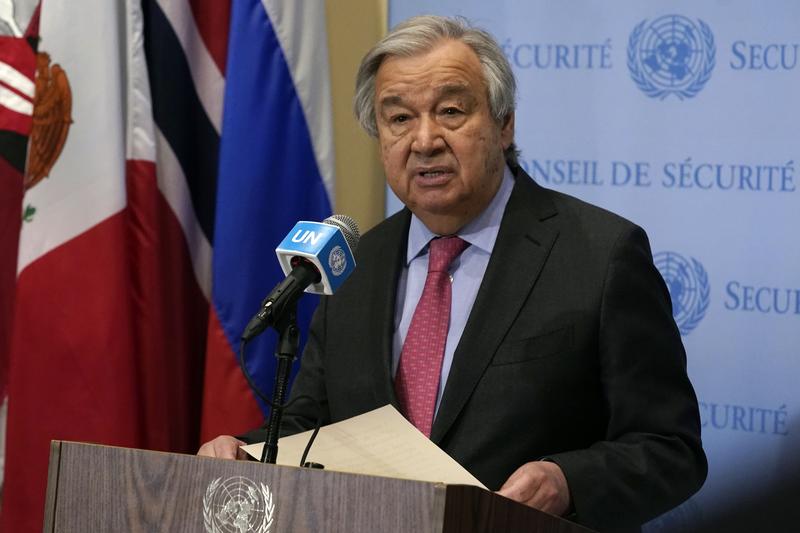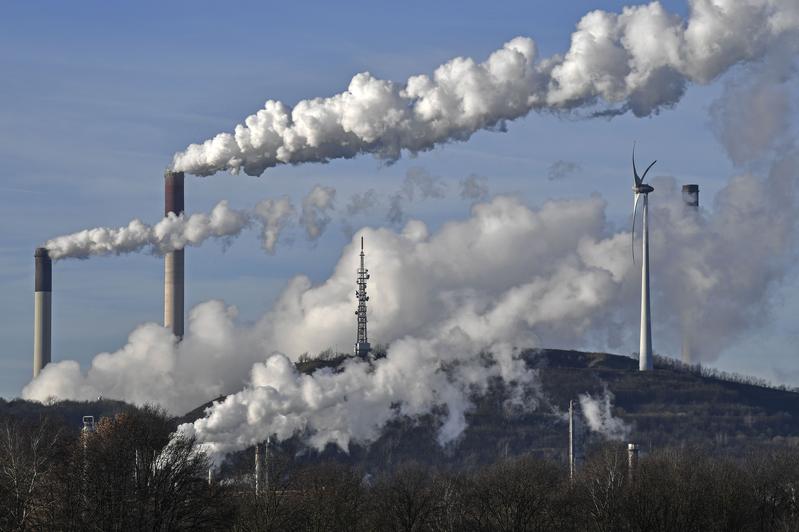 United Nations Secretary General Antonio Guterres makes a statement outside the Security Council at UN headquarters, March 14, 2022. (RICHARD DREW / AP)
United Nations Secretary General Antonio Guterres makes a statement outside the Security Council at UN headquarters, March 14, 2022. (RICHARD DREW / AP)
UNITED NATIONS – UN Secretary-General Antonio Guterres warned on Monday that the world is "sleepingwalking to catastrophe" and the 1.5 degrees Celsius goal is in danger.
With the planet warming by as much as 1.2 degrees, and where climate disasters have forced 30 million to flee their homes, Guterres warned: "We are sleepwalking to climate catastrophe."
The goal to limit future warming to 1.5 degrees Celsius, highlighted in the Paris Agreement on climate change, and driven home in last November's COP26, gathering in Glasgow, is now on "life support" and "in intensive care," the UN chief told the Economist Sustainability Summit.
READ MORE: UN chief says limate crisis a code red for humanity
According to the top UN official, while some progress was made at COP26 last year, "the enormous emissions gap" underscored the fact "the main problem was not solved – it was not even properly addressed."
Countries could become so consumed by the immediate fossil fuel supply gap that they neglect or knee-cap policies to cut fossil fuel use.
Antonio Guterres, UN Secretary-General
"Keeping 1.5 alive requires a 45 percent reduction in global emissions by 2030 and carbon neutrality by mid-century," he said.
According to current national commitments however, global emissions are set to increase by almost 14 percent during the rest of the decade.
Last year alone, global energy-related CO2 emissions grew by 6 percent "to their highest levels in history," Guterres said, as coal emissions surged "to record highs."
"In our globally connected world, no country and no corporation, can insulate itself from these levels of chaos."
Noting that developed and emerging G20 economies account for 80 percent of all global emissions, he drew attention to a high dependence on coal but underscored that "our planet can't afford a climate blame game."
Referring to developed countries, Guterres said that they must not put the onus on emerging economies to accelerate their transition nor must emerging economies responding by saying, "you exported carbon-intensive heavy industrial activities to us in return for cheaper goods."
"We can't point fingers while the planet burns," the secretary-general stressed.
ALSO READ: China-US cooperation vital in tackling climate crisis, says Guterres
"Countries could become so consumed by the immediate fossil fuel supply gap that they neglect or knee-cap policies to cut fossil fuel use," Guterres insisted. "This is madness."
 In this Jan 16, 2020 file photo, a Uniper energy company coal-fired power plant and a BP refinery are seen beside a wind generator in Gelsenkirchen, Germany. (MARTIN MEISSNER / AP)
In this Jan 16, 2020 file photo, a Uniper energy company coal-fired power plant and a BP refinery are seen beside a wind generator in Gelsenkirchen, Germany. (MARTIN MEISSNER / AP)
As fossil fuels reliance continues to put the global economy and energy security at the mercy of geopolitical shocks and crises, the timeline to cut emissions by 45 percent is extremely tight, he said.
"Developed countries, multilateral development banks, private financial institutions and companies with the technical know-how - all need to join forces ... to deliver support at scale and with speed to coal-intensive economies," he added.
Although a "major challenge," developed and emerging economies must cooperate with each other for all G20 countries to deliver emission reductions.
The secretary-general said that "even the most ambitious action" cannot erase the fact that "the situation is already bad" and in some places irreversible.
"Adaptation and mitigation must be pursued with equal force and urgency ... adaptation investments need to be dramatically scaled up to keep pace with accelerating impacts," he said, calling on all donors and technical partners to work with the UN and vulnerable governments to identify and fund projects and programs.
The top UN official also pressed for new, simplified eligibility systems and increased adaptation and resilience investment.


